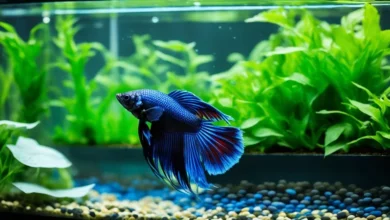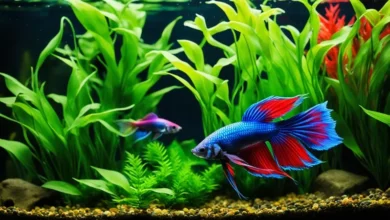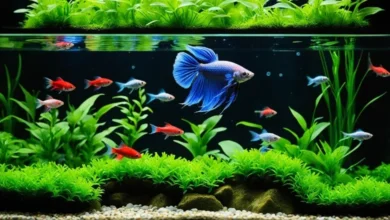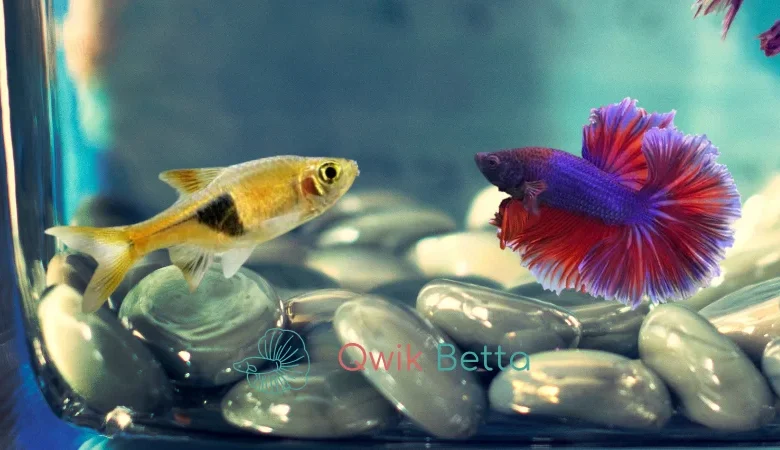
Betta fish and Rasboras are two popular choices for freshwater aquariums, each known for their vibrant colors and unique behaviors. But can these two species coexist harmoniously? In this article, we’ll explore whether Betta fish and Rasboras make perfect tank mates, diving into their characteristics, compatibility, and best practices to ensure a thriving, peaceful tank environment.
Understanding Betta Fish
Betta fish, also known as Siamese fighting fish, are renowned for their striking colors and elaborate fins. Native to Southeast Asia, they are labyrinth fish, meaning they can breathe atmospheric air thanks to a specialized organ.
Behavior
Betta fish are known for their territorial and sometimes aggressive nature, especially males. They can become hostile towards other fish that they perceive as a threat, particularly those with similar fin shapes and colors.
Tank Requirements
To keep a betta fish happy, you need a tank at least 5 gallons big. This size gives them room to move and claim their territory. Betta fish enjoy having plants and hiding spots in their tank. It helps them feel safe and at home.
Understanding Rasboras
Rasboras are small, peaceful freshwater fish well-known for their bright colors. They love being in school. These fish do great in planted tanks with space to swim. They are perfect friends for bettas.
Behavior
Rasboras are calm and not mean. They naturally group. This makes a beautiful scene in your tank. They are always busy, checking out their home and finding food. These traits make rasboras good for community tanks with bettas and similar fish.
Tank Requirements
Rasboras need lots of space and plants to be happy. A 15-gallon tank is the smallest for 8-10 of them. If you have more, you’ll need a bigger tank. Your tank should have many live plants. Plants make the tank look nice and give rasboras places to hide and play. Keep the water temperature from 72-82°F and the pH from 6.0-7.5 stable. This environment is key to their health and happiness.
Compatibility of Betta Fish and Rasboras
Finding out if betta fish and rasboras get along is pretty complex. It’s all about their environmental needs and feeding habits. For them to live together happily in a fish tank, we need to carefully meet their needs.
Environmental Needs
Betta fish need at least 5 gallons of water to live well. On the other hand, Harlequin rasboras require a 15-gallon tank. The water temperature they like also differs. Bettas thrive in water between 78 and 81 Fahrenheit, whereas Rasboras are okay with 72 to 80 Fahrenheit. They also have different preferences for water acidity and hardness.
Feeding Habits
What betta fish and rasboras eat is crucial too. Bettas love meat and need special food. Yet, Harlequin rasboras don’t mind being more varied in their diet. So, making sure they all get the right food is key to their well-being together.
Benefits of Keeping Betta Fish and Rasboras Together
Having betta fish and rasboras in the same tank is not just beautiful. It can also help keep your community tank calm. The rasboras’ bright colors and movement enhance your tank’s look. This adds to the betta fish’s elegance and makes the whole tank more enjoyable to watch.
Visual Appeal
The mix of colors in betta fish and rasboras makes your aquarium look amazing. The betta’s long, flowing fins match well with the rasboras’ shining scales. This creates a beautiful scene. When rasboras swim in a group, they move in harmony. This elegant dance makes the tank a joy to see, both for you and your pets.
Stress Reduction
Rasboras can offer a lot to your tank, especially to shy betta fish. Bettas can be territorial and often get stressed. But with rasboras around, they might relax more. Watching the lively rasboras can keep the betta fish from feeling too focused on their space. This makes for a happier tank where all the fish can thrive.
Challenges of Keeping Betta Fish and Rasboras Together
Betta fish and rasboras can live in the same tank, but you must consider some challenges. Overcrowding is a big issue. It can cause fights over territory. Bettas can get aggressive, especially if they feel cramped. This can stress out the rasboras. This leads to health and behavior problems.
Overcrowding
Putting bettas and rasboras in a small tank makes things worse. Bettas need at least 5 gallons. Rasboras need much more, like 15 gallons. If they don’t have enough space, they become stressed. This stress can turn into aggression or health issues.
Health Concerns
The mismatch between bettas and rasboras can cause health issues too. Bettas might bully the rasboras. They could nip at them, making them sick. The different needs of these fish, like water quality, can also cause health problems.
But, there are ways to handle these problems. Start with a big, well-planted tank. Keep the water clean. Watch how the fish interact closely. Adding hiding places can lower stress. Separating bettas and rasboras at night could also help. This care ensures they all stay healthy and happy together.
Creating the Ideal Tank Environment
The key to a happy tank is getting the environment just right for betta fish and rasboras. Choosing the best plants, decorations, and substrate makes a natural home. This habitat lessens stress and meets the needs of these lively fish.
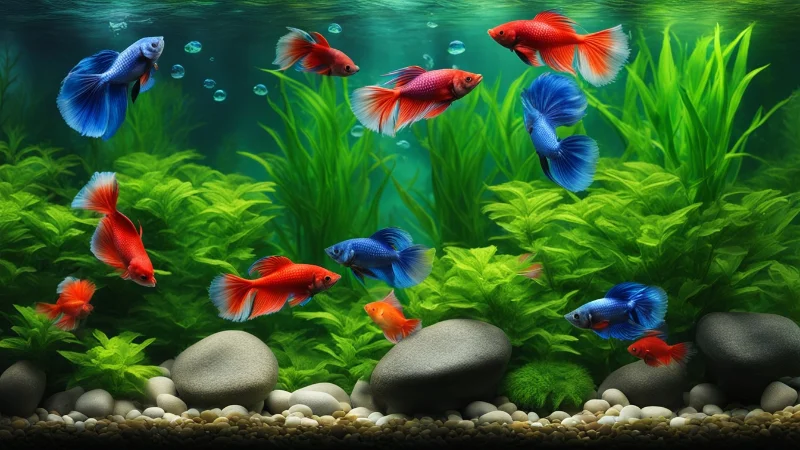
Plants and Decorations
Add plenty of plants to your tank. These create hideaways and make the fish feel safe. Try plants like Java Fern and Anubias. They look good and keep the water right.
Don’t forget the decorations. Things like driftwood and rocks are great for the fish. They make the tank look like the fish’s real home.
Water Parameters
For bettas and rasboras, water conditions are very important. Keep the temperature from 75 to 80 degrees. Use 1-watt heaters for each liter of water.
Maintain a pH level between 6.5 and 7.5 for bettas, checking it regularly. Keep nitrates below 40 ppm and change the water immediately if nitrites are detected.
Feeding Betta Fish and Rasboras
It’s crucial to feed betta fish and rasboras right for their health and peace in your tank. You have to think about what they need to eat and when to feed them. This keeps them happy and prevents fighting over food.
Feeding Schedule
Both betta fish and rasboras need special feeding times. Betta fish eat small amounts several times a day. Rasboras, on the other hand, do well with two meals daily. Set up different feeding times for them. This way, all fish get their share while avoiding food fights.
Preventing Overfeeding
Too much food in a tank is bad news. It makes the water dirty and can harm the fish. To stop overfeeding, keep an eye on how much you feed them. Stick to a regular feeding plan and watch how they eat. This way, you can be sure they’re getting all they need without the extra food problems.
Health and Wellness
Keeping betta fish and rasboras healthy is very important when they share a tank. It’s crucial to know how to keep them well and spot any signs of stress or sickness. This ensures they both stay happy and healthy for a long time.
Prevention Tips
There are steps you can take to keep your betta fish and rasboras in good shape. This includes checking the water quality often and using a water conditioner to make the water safe. Also, when you get new fish, keep them in a separate tank for a while. This helps stop diseases from spreading.
Make sure the tank is big enough and has places for your fish to hide and explore. This helps reduce stress and keeps them healthy.
Signs of Stress
It’s important to know the signs of stress in your fish. If they lose interest in food, seem tired, or swim oddly, they might be stressed. Look out for physical signs too, like clamped fins or color changes. This could mean they’re sick.
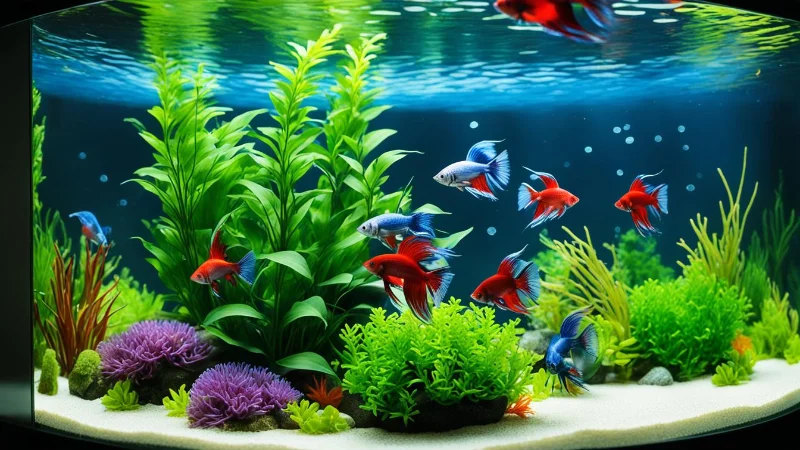
Watching for these signs and acting quickly can keep your fish well. This means paying attention to their behavior and looks. If needed, make changes to the tank to help them feel better.
Behavioral Observations
Watching how betta fish and rasboras behave together is key. It shows if they can live well in the same tank. By doing this, fish owners learn a lot about their pets.
Peaceful Interactions
When betta fish and rasboras live in harmony, it’s a joy to see. Betta fish swim with the rasboras, searching for food and checking out the tank. This teamwork hints at a good relationship. The rasboras can stick together without bothering the betta’s space.
Behavioral Changes
Yet, keeping an eye on their behavior is crucial. Changes like a betta fish flaring up or Rasboras acting strange show problems. These signs indicate they might not be getting along. It’s important to act, like adding hiding spots, to make their home a peaceful one.
Maintaining Water Quality
It’s very important to keep the water where betta fish and rasboras live, clean. Clean the tank often by vacuuming the bottom and cleaning the filter. This makes sure the water stays fresh for your fish friends.
Filtration Systems
A good filtration system is essential to keep the water clean and free of harmful toxins. A filter that provides gentle water flow is ideal for Betta fish and Rasboras.
Regular Cleaning
Changing the water often is key. Experts say to take out 25-70% of the water. Then, add fresh, treated water back in. This keeps the water safe for your fish and prevents sickness.
Testing Water Parameters
Checking the water’s health regularly is a must. Use a test kit to check pH, nitrite, nitrate, and more each week. Ensure the water has a pH of 7 and nitrate below 40 ppm for a good home for your fish.
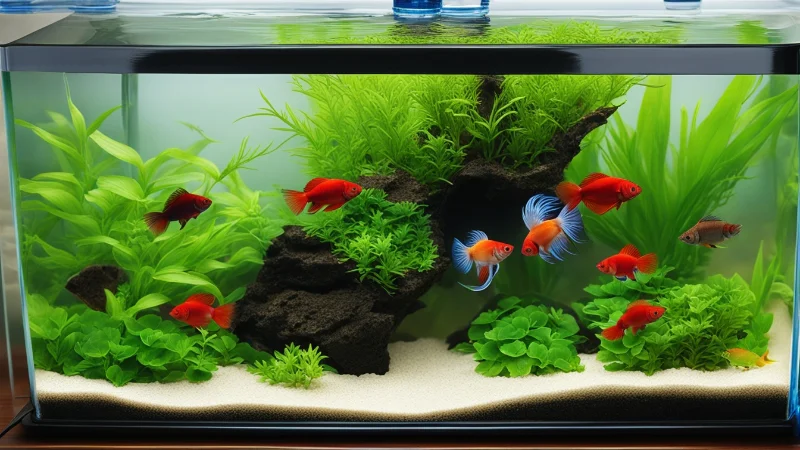
By cleaning the tank often, checking the water quality, and keeping the filter working well, your betta fish and rasboras will be healthy and happy.
Tank Mates for Betta Fish
Betta fish and rasboras might get along, but it’s smart to look for other friends for bettas, too. Some friends might not be right because they nip at fins or are too aggressive. This could make your betta fish anxious and mess up your tank’s peace.
Suitable Species
Suitable tank mates for Betta fish include peaceful species like Corydoras, small Tetras, and Snails. These species generally stay out of the Betta’s way and reduce the risk of aggression.
Unsuitable Species
Avoid fish that are known to nip or bully, like certain barbs, cichlids, and big tetras with bettas. They can damage a betta’s beautiful fins, which could hurt the betta’s health and happiness. Even colorful fish with pretty fins, such as guppies, might not be a good idea. This is because bettas might defend their area more around them due to their look.
Introducing New Fish
Introducing new fish to your tank with a betta should be slow and careful. Always keep new fish in quarantine to stop diseases from spreading. Watch how they all get along. If any fish seems mean or makes others anxious, you might need to take them out. More hiding places and plants can make this process easier for everyone.
Tank Mates for Rasboras
Rasboras are peaceful and enjoy living with other fish. This makes them great for a community tank. But, you need to pick the right fish to live with them. We’ll talk about which fish are good friends for rasboras and which ones to avoid.
Suitable Species
It’s key to choose friends for rasboras that like the same water and act nicely. Team players, like neon tetras, ember tetras, and harlequin rasboras, make a lively tank. Also, Cory Catfish and Kuhli Loaches get along well since they hang out in different spots.
Unsuitable Species
Stay away from bullies and fish that might munch on the rasboras. Keep clear of bettas, big cichlids, and some barbs. Also, avoid speedy fish that hog the food, like some danios. Make sure all tank mates will be friendly and won’t stress out the rasboras.
Introducing New Fish
Adding new fish with care is very important in a rasbora tank. Quarantine them first to check for sickness or fighting. After bringing them in, keep an eye out for trouble. Clean water and hiding spots can make the new friends’ move easier.
Breeding Betta Fish and Rasboras
This article discusses how betta fish and rasboras can live together. It also dives into how you can breed them. Learning about their breeding conditions, care for fry, and facing challenges in a community tank is vital for fish lovers.
Breeding Conditions
Betta fish and rasboras need specific conditions to breed. Betta fish have unique mating practices and need a separate tank. Rasboras prefer spawning in a well-planted tank with warm, clean, and slightly acidic water.
Care for Fry
Looking after fry from betta fish and rasboras can be tricky. Betta fry needs regular feeding and clean water. Rasbora fry might have to be kept away from other fish to keep them safe. It’s important to set up their environment with spawning grounds and safe spots for them to grow.
Challenges in a Community Tank
Putting breeding fish and fry in a community tank with betta fish and rasboras can be hard. Adult betta fish might be too aggressive. There could also be a fight for food and space. You need to watch the tank closely and change things if needed to keep everyone safe.
Conclusion
Combining Betta fish and Rasboras in a single tank can be a rewarding experience if done correctly. By understanding the needs and behaviors of both species, creating a suitable environment, and monitoring interactions closely, these colorful fish can coexist harmoniously.
With proper care and attention, a tank featuring Betta fish and Rasboras can become a vibrant and dynamic centerpiece in any home.
FAQs
- How can I prevent Betta fish from attacking Rasboras?
- To prevent aggression, ensure the tank is large enough, with plenty of hiding spots and visual barriers. Monitor interactions closely and separate the fish if the aggression persists.
- What size tank is ideal for Betta fish and Rasboras together?
- A tank of at least 20 gallons is recommended to provide ample space and reduce territorial behavior, ensuring both species have room to thrive.
- Can Betta fish and Rasboras eat the same food?
- Yes, both species enjoy similar diets, including high-quality pellets, flakes, and live or frozen foods. Ensure a varied diet to meet their nutritional needs.
- What are the signs of a stressed Betta fish?
- Signs of stress in Betta fish include hiding, lethargy, loss of color, and erratic swimming. Addressing the underlying causes promptly is essential for their well-being.
- How often should I clean the tank when housing Betta fish and Rasboras?
- Regular maintenance, including weekly partial water changes and cleaning of the substrate and decorations, helps maintain water quality and a healthy environment.
- Can I keep other fish with Betta fish and Rasboras?
- Yes, other peaceful community fish like Corydoras, small Tetras, and Snails can coexist with Betta fish and Rasboras provided the tank is large enough and well-maintained.
